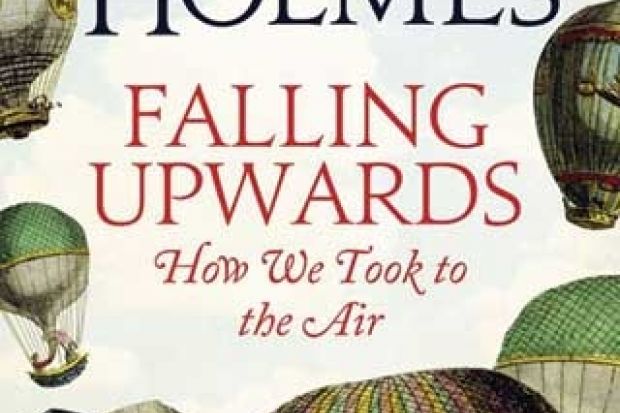As a denizen of the city with the largest balloon festival in Europe, one grows accustomed to seeing balloons in the summer months. And yet the present reviewer tends to see them largely in terms of marketing (they are always plastered over images of Bristol), consumption and leisure. In short, pleasing as they may be, they chime purely in the registers of frivolity and finance. Enter Richard Holmes, whose Falling Upwards is a history of ballooning from the 1780s to around 1900 that encourages us to see in ballooning an experience that hits some very different notes in the melody of European and US history.
If Holmes’ case were grounded in pragmatics, in the practical and/or scientific impact of balloons, even the customary elegance of his prose would not be able to hide how threadbare the argument would look. For a hard-headed reading of Falling Upwards shows that balloons had a small part to play in unravelling the atmospheric layering of our planet and that they came to Paris’ rescue during Bismarck’s siege of 1870, this itself building on their limited efficacy as “spies in the skies” in the American Civil War during the previous decade. As becomes clear on reading Falling Upwards, Holmes’ case is “not really about balloons at all. It is about what balloons give rise to. It is about the spirit of discovery itself, the extraordinary human drama it produces.” In short, to Robert Macfarlane’s Mountains of the Mind, Holmes adds the airy castles of our imagination.
And here the author has a riveting tale to tell. We have, on the one hand, the showmen and - most notably - women who took to the air, inhabiting the borders between science and the circus. Thus the staged exploits of Sophie Blanchard gripped Paris until her fiery death in 1819, and the same city was galvanised 40 years later by the astute publicity of Félix Nadar, who was the first to offer the public photographs of the world from aloft. At the other extreme were the scientific efforts of James Glaisher in Britain in the 1860s, his balloons being ascending rafts of instruments aimed at unravelling the atmosphere’s secrets. But even here, Glaisher’s near-death experience at seven miles up brought science and sensation together.
On the other hand, Holmes also unveils the literary response to ballooning, the ways in which authors such as Henry Mayhew, Jules Verne and H.G. Wells responded to the imaginative possibilities of conquering the empyrean. Perhaps most remarkable here is Victor Hugo’s Letter on Flight, a response to Nadar’s efforts, which sees in ballooning the potential that “the old Gordian knot of gravity will finally be untied”, with political and utopian consequences: “Geo will become Demos - the earth will belong to the people.”
Falling Upwards is self-confessedly the product of a balloon enthusiast’s pen. As such, it is at some level advocacy, Holmes being far weaker in characterising the equally distinguished vein of literary scepticism about ballooning that runs from Samuel Johnson through to Charles Dickens and beyond. While acknowledging the nagging cultural valence of balloons as so much hot air, as mere bubbles rising to no purpose, Holmes has rather less interpretative charity for this side of the argument. And yet Falling Upwards is none the worse for this: if we invest some interpretative charity in Holmes himself, he allows us to see the grandeur in this view of life from the balloon’s basket, nowhere more so than in his closing account of Salomon Andrée’s doomed 1897 attempt to reach the North Pole. It is easy to configure this tale in terms of absurdity, charlatanry and bathos, as Andrée’s grandiloquent claims for his ballooning innovations were punctured by the realities of the polar wind patterns, which left the course he followed looking like a drunken snail’s trail and which got no further than 82° 45’N (a mark that had been reached a half-century earlier). In Holmes’ hands, however, the human drama of the Andree expedition is emphasised, the bravery of the three men, their kinship and dignity in the face of death. Bathos becomes pathos as Holmes crafts a Scott of the ether. By letting slip some of the ballast of pragmatics and scepticism, Falling Upwards allows our historical imaginations to soar aloft.
Register to continue
Why register?
- Registration is free and only takes a moment
- Once registered, you can read 3 articles a month
- Sign up for our newsletter
Subscribe
Or subscribe for unlimited access to:
- Unlimited access to news, views, insights & reviews
- Digital editions
- Digital access to THE’s university and college rankings analysis
Already registered or a current subscriber?
